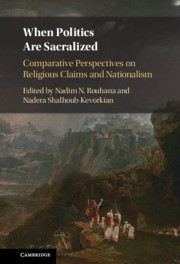Book contents
- When Politics Are Sacralized
- When Politics Are Sacralized
- Copyright page
- Contents
- Figures
- Maps
- Tables
- Contributors
- Preface and Acknowledgments
- 1 A Comparative Perspective on Religious Claims and Sacralized Politics
- Part I Israel
- Part II India
- Part III Sri Lanka
- Part IV Serbia
- 9 Serbian Jerusalem
- Part V Iran
- Part VI Saudi Arabia and Wahhabism
- Part VII Northern Ireland
- Part VIII Palestine
- Index
- References
9 - Serbian Jerusalem
Inventing a Holy Land in Europe’s Periphery, 1982–2019
from Part IV - Serbia
Published online by Cambridge University Press: 10 June 2021
- When Politics Are Sacralized
- When Politics Are Sacralized
- Copyright page
- Contents
- Figures
- Maps
- Tables
- Contributors
- Preface and Acknowledgments
- 1 A Comparative Perspective on Religious Claims and Sacralized Politics
- Part I Israel
- Part II India
- Part III Sri Lanka
- Part IV Serbia
- 9 Serbian Jerusalem
- Part V Iran
- Part VI Saudi Arabia and Wahhabism
- Part VII Northern Ireland
- Part VIII Palestine
- Index
- References
Summary
The chapter examines discourses of comparison between Kosovo and Jerusalem invented by the Serbian nationalist movement arguably amidst the Yugoslav crisis in the 1980s. Serbian religious nationalism claims the territory of Kosovo as a holy land in ways that parallel Israeli claims to Jerusalem. This argument excludes the majority ethnic Muslim Albanians who live in Kosovo and claim political independence. Further, Serbs see themselves as collective victims like the Jews. Citing Israel as a role model for religious nationalist struggle and imitating Israeli policies toward Palestinian Muslims, Serbian claims are based on mythical historic rights, ancient religious claims, and preserved historic sites. The struggle for Kosovo as Jerusalem is cemented by religion and carried on by the Serbian Orthodox Church, which backed ethnic cleansing in the Balkan wars of the 1990s using these arguments. Counting on Israeli support for the Serbian cause, as evidenced by state and non-state visits of Israelis to Serbia, Serbian nationalism aims at making the conflict over Kosovo global.
Keywords
- Type
- Chapter
- Information
- When Politics are SacralizedComparative Perspectives on Religious Claims and Nationalism, pp. 215 - 244Publisher: Cambridge University PressPrint publication year: 2021

